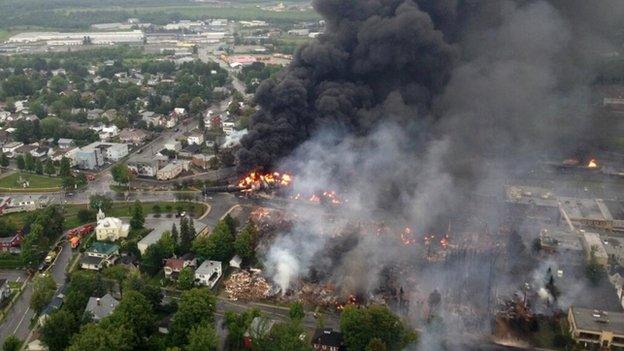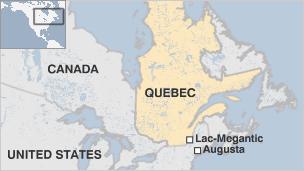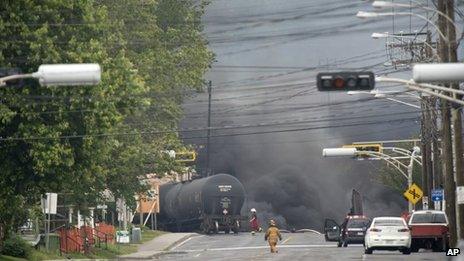Canada train blast: At least one dead in Lac-Megantic
- Published

Eyewitnesses reported that the town centre was crowded at the time of the blast
Police say at least one person has died after a driverless train carrying light crude oil exploded in the Canadian town of Lac-Megantic.
The blast sent a fireball and black smoke into the air, forcing the evacuation of 1,000 people.
Dozens of buildings were destroyed in the town, about 250km (155 miles) east of Montreal.
The train's cars reportedly uncoupled from a parked engine and derailed early on Saturday.
Rail company spokesman Christophe Journet said the train had been immobilised in a neighbouring village before a scheduled crew change, but for an unknown reason had then started rolling downhill into Lac-Megantic.
Eye witnesses said that by the time the driverless train reached the town it was travelling at considerable speed.
Local media reported 60 people missing, although police officials have not confirmed this.
However, police spokesman Guy Lapointe said: "We have already confirmed one death and we expect there will be others."
Some 120 fire fighters have been fighting the blaze, which has continued for around 24 hours.
Eyewitnesses reported that the town centre - where there are a number of bars - was crowded at the time of the blast, and that "chaos" ensued.
A search for bodies is due to begin at dawn on Sunday, local officials say.
Explosion fears
The Montreal, Maine & Atlantic train had five locomotive engines and 73 cars filled with light crude oil, and was parked in the village of Nantes - about 7km (four miles) from Lac-Megantic - during an overnight driver shift-change, a company spokesman told Canada's La Presse newspaper.
The cars filled with fuel somehow became uncoupled, causing them to roll downhill into the town and derail, said the spokesman, Joe McGonigle.
Sgt Gregory Gomez Del Prado: "We do fear that there are going to be fatalities"
"It seems that the brakes were tight on locomotives," Mr McGonigle told La Presse. "We found the locomotives higher up, half a mile (800m) away."
Some of the cars exploded, creating a massive fireball and setting fire to nearby homes and businesses.
A one-kilometre exclusion zone has been set up amid fears of more pressurised containers exploding.
'Everything gone'
"When you see the centre of your town almost destroyed, you'll understand that we're asking ourselves how we are going to get through this event," an emotional Mayor Colette Roy-Laroche told a televised news briefing.
Resident Claude Bedard described the scene of the explosions as "dreadful''.

"We've never seen anything like it," he was quoted as saying by the Associated Press news agency.
"The Metro store, Dollarama, everything that was there is gone."
Firefighters from across the border in the US are helping tackle the blaze.
Prime Minister Stephen Harper said in a statement: "Our thoughts and prayers go out to the families and friends of those affected by this morning's tragic train derailment and subsequent fires in Lac-Megantic, Quebec.
"We hope evacuees can return to their homes safely and quickly.
"The people of Lac-Megantic and surrounding areas can rest assured that our government is monitoring the situation and we stand by ready to provide any assistance requested by the province."
Some of the train's cargo spilled into the nearby Chaudiere river, said Environment Quebec spokesman Christian Blanchette, adding that communities downstream of Lac-Megantic had been warned to take care if using river water.

Firefighters set up a perimeter around the blaze as worried residents looked on
A mobile laboratory had been set up to monitor the quality of the air, he added.
The train was carrying the crude oil from the Bakken Field in North Dakota. Montreal, Maine & Atlantic owns more than 800km (500 miles) of track serving Maine, Vermont, Quebec and New Brunswick.
A lakeside town that is home to some 6,000 people, Lac-Megantic is close to the US border with Vermont and 210 km (130 miles) north of Maine's capital, Augusta.
- Published6 July 2013
- Published29 May 2013
- Published25 May 2013